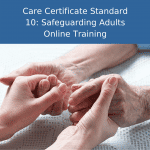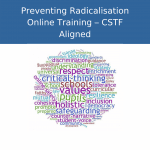Description
Female Genital Mutilation Training
In this online Female Genital Mutilation, e-FGM training course, learners will gain the skills to recognize the signs of FGM. This will also include understanding its impact on victims and grasping the 4 R’s of child protection.
It empowers your staff to apply their knowledge in the workplace and provides guidance on how to respond when suspecting a child is at risk of FGM.
- Developed by professionals.
- Accredited by The CPD Accreditation Group.
- 100% online, learn at your own time and pace.
- Translated into over 100 different languages
- download instant certificate.
A recent study unveiled that an estimated 137,000 women in England and Wales are living with the consequences of FGM.
Understanding the horrifying consequences equips you to provide better care to those affected, potentially transforming their lives for the better. Your awareness can make a significant difference in supporting these women.
Course Outline:
The aim of this course is to enhance your understanding of female genital mutilation, including its signs, and familiarize you with the relevant legislation.
The key points covered in this course are:
- Defining FGM
- Signs of FGM
- 4 R’s of child protection
During the FGM training, learners can expect the following:
- Defining FGM: Gain a comprehensive understanding of what female genital mutilation (FGM) entails, including its cultural, social, and health implications.
- Signs of FGM: Learn to recognize the physical and behavioral signs that may indicate a person has undergone or is at risk of undergoing FGM. Develop the skills to identify and respond to potential cases sensitively and effectively.
- 4 R’s of Child Protection: Explore the principles of the 4 R’s framework – Recognise, Respond, Report, and Record – in the context of child protection. Understand your role in identifying and safeguarding individuals at risk of FGM, and learn how to appropriately respond, report concerns, and maintain accurate records.
This training will empower individuals to contribute to the prevention and intervention efforts against FGM, ultimately working towards the protection and well-being of those affected.
Learning Outcome:
This comprehensive course aims to provide you with the necessary knowledge and skills to identify and respond to Female Genital Mutilation (FGM) effectively. By the end of the course, you will:
- Gain an understanding of the four types of Female Genital Mutilation and their impact on victims.
- Reflect on your emotional response to FGM and develop empathy towards those affected.
- Acquire the ability to recognize the signs of Female Genital Mutilation.
- Familiarize yourself with the key legislation pertaining to FGM.
- Understand how these laws apply to various work settings.
- Describe the safeguarding procedures associated with Female Genital Mutilation.
- Feel confident in guiding victims towards appropriate support services for assistance.
Frequently Asked Questions
Our training specialists frequently receive common questions regarding understanding Female Genital Mutilation (FGM) when working with children and young people.
It is crucial for anyone in such roles to have a clear understanding of what FGM is and its implications. Here, we address some of these common queries to provide you with valuable insights and knowledge.
What is FGM Training?
FGM (female genital mutilation) training is an essential course that equips staff with the necessary knowledge and skills to safeguard, support, and care for vulnerable individuals.
The training focuses on teaching participants how to:
- recognize the signs of FGM,
- enabling them to take proactive measures to prevent it from occurring.
By undergoing this training, staff members become better equipped to:
- identify at-risk individuals,
- provide appropriate support, and
- contribute to the prevention of FGM.
It is a crucial step in ensuring the safety and well-being of those at risk and creating a society free from this harmful practice.
Is it illegal to practice FGM in the UK?
How long is eFGM training?
The duration of e-training on Female Genital Mutilation (ee-FGM) can vary depending on the specific program or course being undertaken. The length of the training can depend on factors such as the depth of knowledge covered, the target audience, and the specific objectives of the training.
FGM training can range from a few hours to several days, depending on the level of detail and expertise required. Introductory courses such as this provides basic information about FGM, its consequences, and the laws surrounding it. These sessions can typically be completed within a few hours.
How long is FGM training valid for?
FGM training does not have an expiry date but should be regularly refreshed and updated. You can also take our Safeguarding Children e-learning course.
Who should take FGM training?
FGM training is recommended for individuals and professionals who work in roles that involve:
- safeguarding and
- caring for vulnerable individuals, particularly children and young people.
This includes but is not limited to:
- healthcare professionals,
- social workers,
- teachers,
- youth workers, and
- those in voluntary or community organizations.





